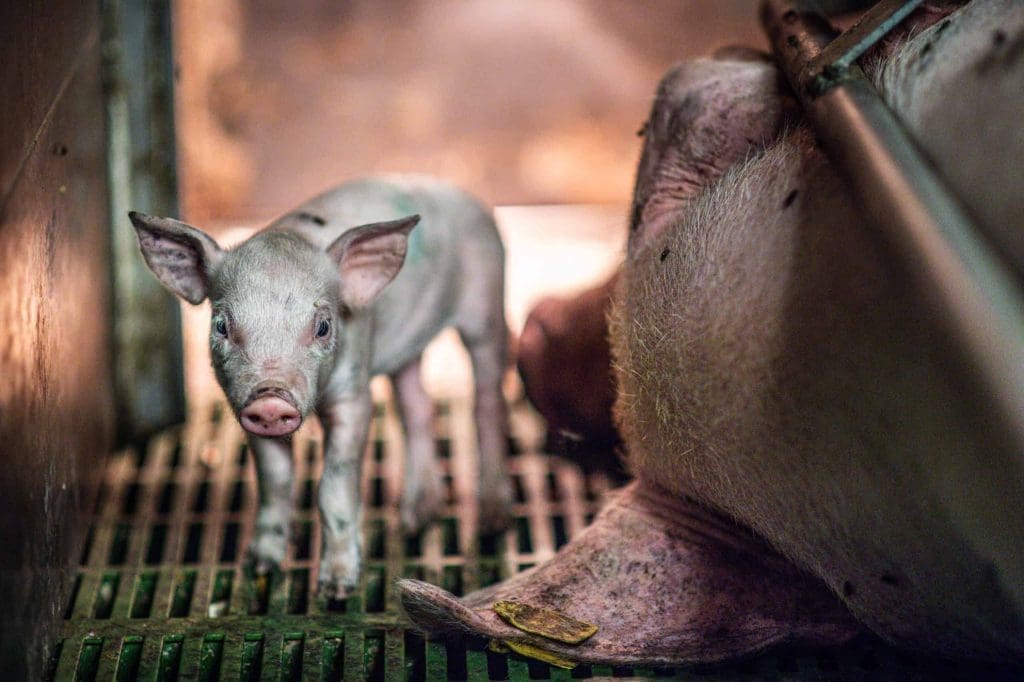Factory farming is a prevalent practice in the food industry, but it often comes at a great cost to the animals involved. The inhumane treatment and cruelty inflicted upon animals raised for food production is not only ethically problematic, but also has serious environmental and health implications. In response to these concerns, many individuals are turning to a vegan lifestyle as an effective way to combat factory farm cruelty. By eliminating support for these practices and choosing a plant-based diet, individuals can make a positive impact on animal welfare, personal health, and the environment. In this post, we will explore the reasons why going vegan is a powerful response to factory farm cruelty, highlighting its benefits and providing practical tips for transitioning to a vegan lifestyle.

Understanding Factory Farm Cruelty
Factory farm cruelty refers to the inhumane treatment of animals raised for food production.
Animals on factory farms are often confined to small and unsanitary spaces, leading to physical and psychological suffering.
Factory farm cruelty includes practices such as debeaking, tail docking, and castration without anesthesia.
A deeper understanding of factory farm cruelty can help motivate individuals to make the switch to a vegan lifestyle.
The Benefits of Going Vegan
Going vegan offers numerous benefits, not only for animals but also for individuals and the environment. By making the switch to a vegan lifestyle, you can:
- Eliminate support for the cruel practices of factory farming: By going vegan, you are actively opting out of the demand for animal products that drives the operations of factory farms. This means taking a stand against practices that involve confinement, debeaking, tail docking, and castration without anesthesia, among others.
- Reduce the demand for animal products: A vegan diet helps to decrease the demand for animal products, which in turn leads to a decrease in factory farm operations. By choosing plant-based alternatives, you are contributing to a more compassionate and sustainable food system.
- Improve personal health and well-being: Adopting a vegan lifestyle can significantly improve personal health. Plant-based diets have been associated with lower risks of heart disease, obesity, and certain types of cancer. By focusing on wholesome plant-based foods, individuals can experience numerous health benefits.
- Contribute to a more sustainable and ethical food system: Going vegan is an effective way to reduce your environmental footprint. Factory farms contribute to deforestation, habitat destruction, and greenhouse gas emissions. By choosing a vegan lifestyle, you are actively reducing the environmental impact associated with factory farming.
Overall, going vegan not only aligns with animal welfare principles but also offers a range of personal and environmental benefits. It is a powerful way to make a positive and meaningful change in your life and in the world around you.
Animal Welfare vs. Factory Farming
Factory farming prioritizes profit over animal welfare. Animals raised in factory farms are treated as mere commodities, often subjected to overcrowded and unsanitary conditions, confinement, and cruel practices such as debeaking, tail docking, and castration without anesthesia.

Choosing animal welfare means supporting alternative farming practices that prioritize the well-being of animals. By opting for ethically produced food sources, individuals can ensure that animals are treated with compassion and allowed to live in environments that meet their natural needs.
Factory farming contributes to the suffering and exploitation of animals, emphasizing the need for a shift towards more compassionate food choices. By recognizing the importance of animal welfare and choosing to go vegan, individuals can actively resist and challenge the cruelty inherent in factory farming.
Transitioning to a Vegan Lifestyle
Transitioning to a vegan lifestyle can be a gradual process. It’s important to remember that everyone’s journey is unique, and finding what works best for you is key. Here are some tips to help make the transition easier:
- Start with small changes: Begin by substituting dairy milk with plant-based alternatives like almond milk or soy milk. Experiment with different options and find the one that suits your taste.
- Explore vegan recipes and meal plans: Look for resources online or in vegan cookbooks to find delicious plant-based meals. Try new ingredients and flavors, and you might be surprised by how much you enjoy them.
- Join online communities and support networks: Connect with others who are also transitioning to a vegan lifestyle. They can provide guidance, advice, and encouragement during your journey. It’s always helpful to share experiences and learn from each other.
Remember, the most important thing is to be patient and kind to yourself during this transition. It’s okay to make mistakes or have slip-ups. Focus on progress, not perfection, and celebrate each step you take towards a more compassionate and sustainable way of life.
The Environmental Impact of Factory Farms
Factory farms contribute to deforestation and habitat destruction.
The excessive use of resources, such as water and land, by factory farms is unsustainable.
Factory farming is a significant contributor to greenhouse gas emissions and climate change.
Choosing a vegan lifestyle can help reduce the environmental impact of factory farming.
Health Implications of Factory Farm Products
Factory farm products, such as meat and dairy, are often associated with negative health effects. Consuming factory farm products can increase the risk of heart disease, obesity, and certain types of cancer. Additionally, factory farm products may contain antibiotics, hormones, and other additives that can be harmful to human health.
Opting for plant-based alternatives can provide numerous health benefits and reduce the risks associated with factory farm products. Plant-based diets are typically lower in saturated fat and cholesterol, and higher in fiber, vitamins, and minerals. They have been linked to lower rates of obesity, heart disease, and certain cancers. Transitioning to a vegan lifestyle can help individuals improve their overall health and well-being.
Taking a Stand Against Animal Cruelty
Choosing a vegan lifestyle is a powerful way to stand against animal cruelty. By eliminating the demand for animal products, individuals can effectively combat the practices of factory farming. But going vegan is just the beginning.

Supporting organizations and initiatives that advocate for animal rights is another important way to make a difference. These organizations work tirelessly to raise awareness about factory farm cruelty and fight for improved animal welfare standards. Whether through donations, volunteering, or spreading the word, everyone can contribute to the cause.
Educating others about the realities of factory farming is essential. Often, people are unaware of the suffering and exploitation that animals endure in these facilities. By sharing information and personal experiences, individuals can help others make more compassionate food choices.
Engaging in peaceful activism is also an effective means of taking a stand against animal cruelty. Participating in protests, signing petitions, and boycotting companies that support factory farming sends a powerful message. It shows that cruelty towards animals is not acceptable and that individuals are willing to fight for change.
Together, with collective effort, we can make a significant impact on animal welfare. By standing up against animal cruelty, we contribute to a more compassionate and just world for all living beings.
Choosing Ethical Food Sources
Choosing ethical food sources means supporting farmers who prioritize animal welfare and sustainable farming practices.
Labeling systems, such as organic or humane certifications, can help consumers identify ethical food sources.
Shopping at farmers markets and local food cooperatives can provide direct access to ethically produced food.
By choosing ethical food sources, individuals can contribute to a more compassionate and sustainable food system.
The Future of Factory Farming
The future of factory farming is uncertain, but there is a growing movement towards more sustainable and ethical alternatives. Consumers are increasingly demanding plant-based products and ethical food sources, challenging the dominance of the factory farming industry.
Advancements in technology and alternative farming methods are paving the way for a future without factory farming. Innovations such as vertical farming, hydroponics, and lab-grown meat offer promising solutions that prioritize animal welfare and sustainability.
By supporting and driving the shift towards sustainable agriculture, individuals can help shape the future of our food system. This can be done by choosing plant-based options, supporting local farmers, and advocating for policies that prioritize animal welfare and environmental sustainability.

Ultimately, the goal is to create a food system that values the well-being of animals, protects the environment, and promotes human health. By actively participating in this movement, we can contribute to a future where factory farming is no longer the norm, but rather a relic of the past.
Conclusion
Transitioning to a vegan lifestyle is not only an effective response to factory farm cruelty, but also a way to promote personal health, environmental sustainability, and ethical food choices. By understanding the realities of factory farm cruelty and the benefits of going vegan, individuals can make a powerful impact on the well-being of animals and the future of our food system. Taking a stand against animal cruelty, supporting ethical food sources, and advocating for sustainable agriculture are all important steps towards creating a more compassionate world. Together, we have the power to shape the future of factory farming and create a more ethical and sustainable food system for all.

4/5 - (11 votes)



